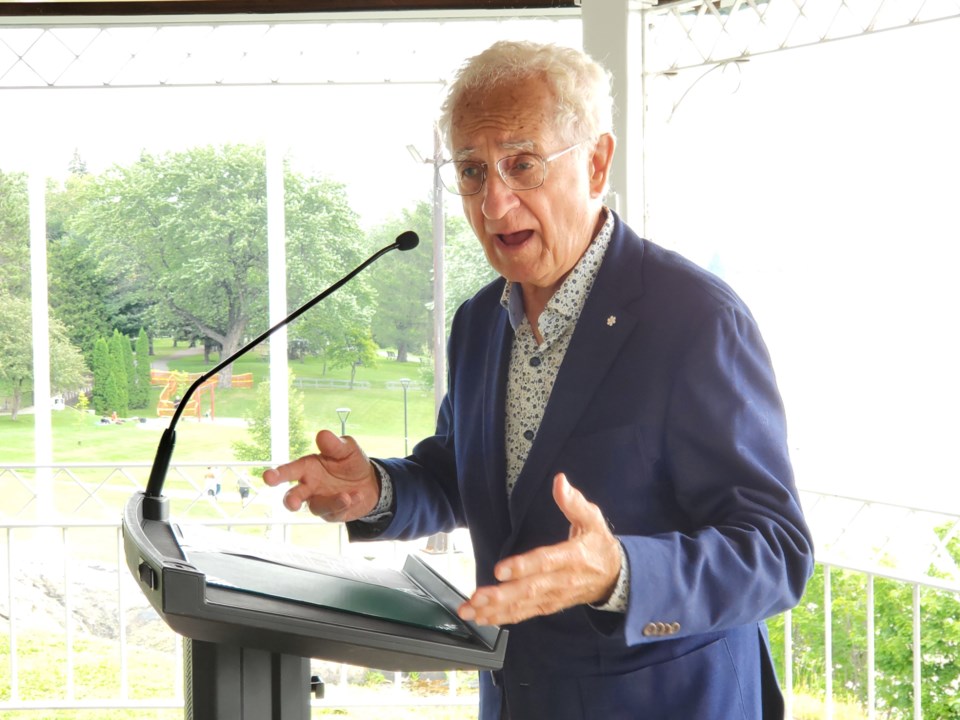As a child, Jim Gordon adored his Great Uncle Willie and wanted to grow up to be a politician just like him.
There are few Ontario politicians who have served their community for as long or with as much dedication as Gordon.
A key player in the foresighted rescue plan known as Sudbury 2001 that transformed Sudbury from a mining town to a regional capital of health care and education, and a tourist destination, Gordon played leaderships roles in efforts to convince the provincial government to fund a cancer treatment centre in northeastern Ontario and, several decades later, to establish the Northern Ontario School of Medicine (now called NOSM University).
"From the time I was 14, I began to think about what I wanted to be. I want to be a politician like my Great Uncle Willie because he did things. He loved life. I thought that was great," said Gordon.
His great uncle, a veteran of the Boer War and the First World War, and an adventurer to boot, was the reeve of Coleman Township in Timiskaming District.
"My Uncle Willie would come to Sudbury and he would talk, laugh and tell stories about visits with the premier. He was so happy and jovial, that I thought I want to be like him. He was one of my heroes."
Now in his mid-80s, Gordon is writing his memoirs and giving his take on many of the events of the last 50 years, a pivotal time in the city's history.
The son of English immigrants, he was influenced by his mother's social conscience and his father's thrift and conservative views.
This explains how he became a "Red Tory," he said.
Gordon attended St. Charles College when it was an all-boys' school on Pine Street.
He was involved in student politics and was given a unique opportunity to be part of a teen program on CKSO Radio in the mid- 1950s. Within a year or so, he was offered his own music program on weekends.
CKSO had a huge audience in those days. Gordon's show was popular enough that he became a local celebrity.
This media experience came in handy years later when he entered politics. Gordon understood how journalists nurture sources for information. He made a point of reaching out to reporters throughout his career when he wanted his side of a story told.
Gordon met his wife, Donna Drew, when they attended Assumption College (now the University of Windsor). The couple have six daughters and 10 grandchildren.
The northern boy got an education in world issues at Assumption. It was located minutes away from Detroit, Mich., at the time the fourth largest American city, and the centre of the automobile industry.
Gordon remembers taking a course from a Father Garvey, a priest who was a friend of Walter Reuther, president of the United Auto Workers of America.
"The name of the course was ‘Social Justice’ and let me tell you there is a lot of injustice out there … in the world. I fully understand what it means to be a just person … to use your talents to benefit people, other people. Otherwise what good are you?"
Gordon served as mayor of the City of Sudbury from 1976 to 1981 and from 1991 to 2000. In 2001, he became the first mayor of the City of Greater Sudbury.
From 1981 to 1987, Gordon represented Sudbury at Queen's Park.
"It was not that I was unhappy as mayor of Sudbury, but I concluded that the MPP had more power than the mayor and, in order to do something to help Sudbury, I needed to be MPP."
He was the first Progressive Conservative elected in the Liberal/NDP swing riding in 40 years, and Sudbury has not been represented by a Tory since Gordon lost to Liberal Stirling Campbell in 1987.
After retiring from politics in 2003, he continues to contribute to the community by volunteering with the Samaritan Centre and the Parkside Centre, and was a member of the executive committee of the Northern Ontario School of Medicine from 2003 to 2011.
Sudbury's longest serving mayor was made a Member of the Order of Canada for his contributions to the economic and social development of the city in 2014.
"A politician has power, but you have to be careful how you use it. You have the power to make a difference," he said
"When I was mayor of Sudbury and I was fairly outspoken and I got away with it. How did I get away with it? I was mayor for 17 years … I got 83 per cent of the vote in my last campaign as mayor.
“I must have done something right because most politicians, when they leave politics, shuffle out the door, if they are not shovelled out the door."
Vicki Gilhula is a freelance writer. Journeys is made possible by our Community Leaders Program.
